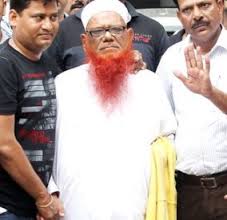
A composed 70-year-old Tunda, whom the security agencies term as a walking encyclopedia of Lashker-e-Taiba's(LeT) pan-India operations, spoke about his differences with Lakhvi during police investigations and gave instances how this cropped up in several discussions, official sources said here.
Tunda allegedly claimed that underworld don Dawood Ibrahim moves around under the ISI cover in Pakistan. He also told the interrogators that he had met Dawood in Karachi several times, said sources.
The Delhi police said that Tunda was connected with ISI, LeT, Jaish-e-Mohammed, IM and Babbar Khalsa.
Tunda, who was on the run for nearly two decades, was arrested on Friday.
Despite being one of the founders of LeT's pan-India operations, Tunda's remorse is that he could not scale the terror outfit's hierarchy as he was termed as a spent force once he arrived in Pakistan from Bangladesh in early 2000.
He claimed that he had not been included in LeT's "bleed India" policy strategy leaving him, his three wives which included a teen-aged Bangladeshi girl and six children virtually on the streets.
In order to earn a livelihood, Tunda, who had helped in indoctrinating many youths from India for terror activities, was given a two storied house bang opposite to Markaz ul Jamaat-ul-Dawah in Muridkee of Sheikhpura district of Punjab where he used to sell perfumes.
Tunda's fundamentalist outlook had its roots after he witnessed the 1985 riots in Mominpura area of Nagpur in Maharashtra, sources said, adding it is believed that after this incident he had started working towards preaching youths to wage war against the government.
Born in a lower middle class family at Delhi, Tunda moved to Pilkhuwa, near the town of Ghaziabad, in his teens and later shifted to Mumbai, where he set up a business dyeing textiles after his job as a 'Hakeem' in the 80s failed to take off in Ghaziabad.
After his initial association with Tanzim Islahul Muslimeen (TIM), or Organisation for the Improvement of Muslims, Tunda told his investigators that he started following the belief of the Jamaat Ahl-e-Hadis', an ideology being followed by LeT.
After fleeing to Bangladesh, Tunda married an 18-year-old girl at the age when he was 56.
While his interrogation continues by a joint team of police and central security agencies, the sources said that he would be grilled about his meeting with Aamir Reza, founder of Indian Mujahideen and other Lashker operatives who had met him while he was in Muridkee.





Comments
Add new comment